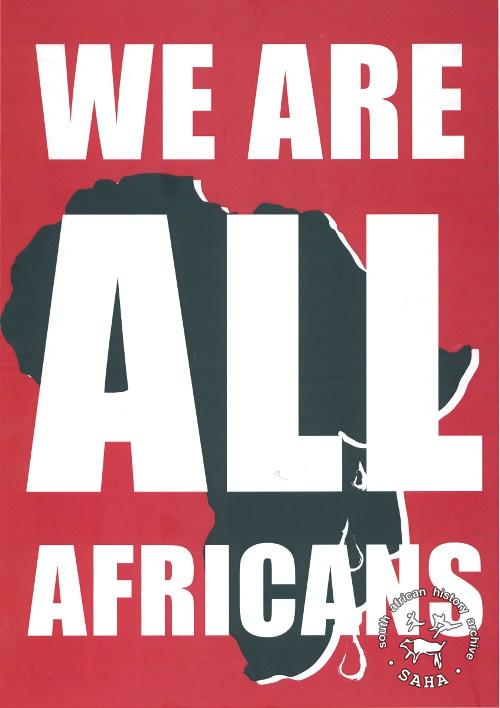Professor Pumla Gobodo-Madikizela, a Desmond and Leah Tutu Legacy Foundation board member who served on the Human Right Violations Committee of South Africa's Truth and Reconciliation Commission (TRC), has this to say about South Africa's most recent outbreak of xenophobic violence: "[xenophobia is a] toxic mix of the unfinished business of post-apartheid healing - social, psychological and economic". Can a lack of commitment to South Africa's reconciliation agenda have a role to play in the recent xenophobic violence?
South Africa's TRC was the mechanism chosen to address South Africa's history of gross human rights violations under apartheid. The Commission was mandated to conduct the investigation and the establishment of as complete a picture as possible of the nature, causes and extent of gross violations of human rights committed during the period from 1 March 1960 until 10 May 1994.

The TRC placed a large burden of forgiveness on the victims of apartheid. The TRC relied on a model of public confession, complete disclosure and subsequent forgiveness and reconciliation that would allow South Africa to move past its history of abuse and oppression. In return, victims of apartheid were offered various forms of restitution, including financial compensation, socio-economic support and the prosecution of those individuals who were denied amnesty for their crimes.
In the 19 years that have passed since the first public hearing of the TRC, however, these forms of restitution have not lived up to their promise. Many South Africans feel that life has not changed for them under a new, democratic dispensation; in return for forgiveness, they remain disenfranchised. In return for tolerance and a progressive attitude to past abusers, they have witnessed silence and an ambivalent attitude to reparations, coupled with a strong focus on the pardoning of perpetrators.
For many victims of apartheid, their burden of forgiveness becomes heavier when they are unable to voice their needs and frustrations to an open, approachable government. Could South Africa's lack of commitment to an ongoing reconciliation agenda be a contributing factor to the frustrations - and their violent expression - demonstrated by her citizens?
WE ARE ALL AFRICANS poster from the SAHA Poster Collection AL2446
What was promised?
Contrasting the South African government's response to Presidential pardons for political crimes, and its commitment to victims of apartheid, is telling. The Presidential pardons process has been conducted largely behind closed doors, with concerned NGOs having to campaign for victims of such crimes to be included in the process. Government has, proactively and at regular intervals, revived the focus on pardoning those accused of "political crimes" under apartheid (and in the immediate years thereafter).
Read the South African Coalition for Transitional Justice's comments on Presidential pardons process here
What has the South African government done for victims? The strict cut-off date for registering as a victim of apartheid, and thus qualifying to financial compensation, has remained fixed at December 1997. This is despite the numbers involved: 17 000 people have officially registered as victims of apartheid. Approximately 15 000 received a once-off financial payment of approximately R30 000. Yet Khulumani Support Group, widely acknowledged as the biggest grassroots network of apartheid victims and survivors, has an active database of 60 000 people who suffered gross human rights violations under apartheid's oppressive system.
Read the International Center for Transitional Justice's commentary on the lack of adequate reparations for victims of apartheid
In terms of post-TRC prosecution, the TRC's granting of amnesty was reliant on full disclosure of crimes committed. Of the over 7112 applications received, only 849 applicants were granted amnesty for their crimes. While many amnesty applications were withdrawn, or did not meet the threshold required for a crime to be considered political, there were still many cases deserving of subsequent prosecution. Wouter Basson, Head of apartheid's Chemical and Biological Warfare programme, was one such individual.
Read the South African Coalition for Transitional Justice's comments about the lack of effective prosecution of apartheid perpetrators
So where does this leave the majority of South Africans? Carrying the heavy burden of forgiveness, without the relief of criminal justice and socio-economic support, and spectating a process that appears to be designed to provide succor to perpetrators of injustice through pardons - rather than demonstrate commitment to those who suffered under the apartheid regime.
South Africans live on a great divide: on the one hand, there is the expectation that democracy will bring about positive change in people's circumstances; and with the liberation movement's history of living in African countries as exiles, South Africa is a welcoming place for other Africans. On the other hand, there is the lived experience of extreme competition for resources that has not been made easier post 1994 - access to education, health care and small business development - that fellow Africans are seen to threaten.
On top of these competing views, is the perceived failure of forgiveness and tolerance as a path to security, prosperity and improved livelihoods. Without strong commitment to its self-imposed reconciliation agenda, the message South Africans receive is that the work of the TRC remains the work of the sufferers. While there is no excuse or apology for violence, understanding its some of its causes can contribute to a safer society for all.





